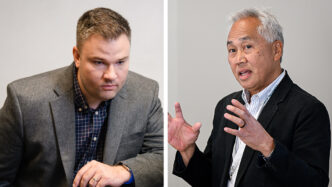The Clemson Composites Center is charging into 2025 with a plan to transform the Greenville area into a hub for researching and developing advanced manufacturing technologies of the future.
Ramy Harik has tripled the size of the center’s staff since joining as director in August 2024. He is now reaching out to potential partners in industry and higher education to broaden the center’s research portfolio.
“I’m very much enjoying how business- and manufacturing-oriented the Upstate is,” Harik said. “People understand that innovation is key, and they are eager to embrace new disruptive technologies that can drive growth and create lasting impact.”
Clemson Composites Center is part of Clemson University and is located in Greenville, an area renowned for its advanced manufacturing capabilities. The center resides in the heart of the fast-growing Interstate 85 corridor between Atlanta and Charlotte, making it uniquely positioned to serve the Upstate region and beyond.
The center’s 21 staff members and students work with industry to better understand how to design, manufacture, and certify composite materials. They have focused on projects serving industries such as automotive, aerospace, defense, mobility, sporting goods and renewable energy.

The facilities include a cutting-edge manufacturing cell equipped with an industrial-size 1,000-ton hydraulic press, integrated with injection molding, thermoforming, and high-pressure resin transfer molding technologies. Together, the technologies offer a wide range of conventional and unique hybrid manufacturing capabilities.
One example of how the Clemson Composites Center drives innovation in the field can be found in the research of Matthew Godbold, a Ph.D. student in automotive engineering. His work bridges the gap between design and manufacturing by transforming conceptual part designs into practical manufacturing processes.
“My research focuses heavily on algorithms, modeling, and simulation, primarily on the computational side,” Godbold explained. “Having access to the advanced equipment at the Clemson Composites Center allows me to validate my models and experience the manufacturing process firsthand. This hands-on approach enhances our ability to predict how the manufacturing cell will behave during production, ultimately improving outcomes and efficiency.”
Composite materials are combinations of two or more materials that are created for their desirable properties, such as strength, durability, and sustainability.

Some composite materials, for example, can be formed into components that are stronger yet lighter than steel, helping make airplanes and automobiles more fuel efficient without sacrificing safety.
Composite materials are a type of advanced material, a growing business in South Carolina. Advanced materials firms in the state announced $1.9 billion in capital investment and 5,272 jobs from 2017-23, according to the state Department of Commerce.
For Harik, reducing the cost of composite materials is a significant challenge because it remains a primary barrier to their broader adoption.
“My goal is to democratize composites, which means to see where you can use composites and then adopt them,” Harik said. “The only hindrance is cost. You could make cars out of composites, and they would be light, strong, and sustainable, but they would not be affordable for everyone right now. The goal is to accelerate the adoption of composites into energy, automotive, mobility at large and in aerospace even more.”
Harik also wants the center to be the hub of a statewide community for all things composites, from research to workforce development, a concept he calls “SC Composites.”

Harik joined Clemson from the University of South Carolina, where he was a professor of mechanical engineering. At Clemson, he serves as the ExxonMobil Employees Endowed Professor in the Department of Automotive Engineering in addition to his role as Clemson Composites Center director.
The 6,500-square-foot Clemson Composites Center is located at the Greenville Technical College Center for Manufacturing Innovation just off Interstate 85 and Laurens Road.
It’s a unique arrangement that helps bring a wide variety of perspectives to the Clemson Composites Center’s work. Few illustrate the benefits of the partnership better than David Kirk, now a research associate at the Clemson Composites Center.
Kirk studied mechatronics at Greenville Technical College and worked at a local stamping plant, then returned to the college to earn a bachelor’s degree in advanced manufacturing technology. That led to a part-time job as a lab technician at the college, in addition to his full-time job at the stamping plant.
When his supervisor at the college noticed his technical and communication skills, he recommended Kirk for the job at the Clemson Composites Center, where he now plays a leading role in running and maintaining the machinery.
Kirk sees scan see a bright future for composite materials in the Greenville area.
“We have tons of manufacturing here, and it seems like there is more moving here all the time,” Kirk said. “It’s a lot of different industries, from electronics and tools to automobiles and their components, to bicycles and aviation. With so many industries setting up shop here in the Upstate and the Clemson Composites Center backing it up, Greenville is primed to lead the way in advanced manufacturing and show the world the power of cutting-edge technology.”







